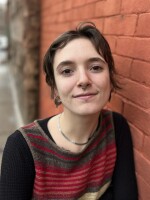On Feb. 6, Turkey and Syria experienced a magnitude 7.8 earthquake. It was one of the strongest quakes the area has experienced in the past 10 years, and many cities in the affected region experienced serious casualties. More than 50,000 people died in Turkey.
The Hatay province of Turkey was one such area and is also home to Pittsburgh engineer Husni Almoubayyed’s family. He sat down with 90.5 WESA’s Zoe Fuller to discuss the earthquake's effects on his parents, and what Turkey looks like as it begins to rebuild.
This interview had been edited for length and clarity.
Zoe Fuller: You were in Pittsburgh at the time the news broke. But your parents were in Turkey. What was that experience like for you?
Husni Almoubayyed: It was a really confusing and stressful day. Essentially, I got a message from my dad saying “We're okay” with no other context. The news hadn't really come out about the earthquake yet. By the time ... the news actually came out and we knew that there was an earthquake that happened, I tried to call or contact again, and by that time all communication was down. We were sort of just waiting and waiting to hear back, but we couldn't really hear back until one more day after that, essentially.
Fuller: What was it like to learn about the earthquake but be so far away from your family?
Almoubayyed: I was really thankful, having gotten that message that said [they] were okay. But, at the same time, it wasn't really enough to just have that message because after the earthquake, there [were] hundreds or thousands of aftershocks. It wasn't really clear if they were okay. Do I take the next flight out from Pittsburgh? And even if I do, it's going to take me several days to get there. At certain points, I felt really helpless, not really knowing what we can do to help.
Fuller: Your parents were in Hatay. What was their experience on the day of the earthquake?
Almoubayyed: So the earthquake happened at around 4 a.m. in the morning local time. So they were totally asleep. And then they woke up, and you know, the whole building was shaking. The whole city was shaking. Everything was falling down around them, all of their furniture, things like that.
Fuller: You said it took a little while for you and your family to be sure of what the next step might be. When did you realize that, and what was it?
Almoubayyed: You know, we just wanted to get them out of their city into a safer city where they can have somewhere they can sleep, essentially. What we had learned is that they were going to sleep in one of our relatives' cars because, you know, you can't really enter any buildings, you can’t really go anywhere at that time. And my brother at that time was on a work trip in Saudi Arabia, so he was the closest out of the three of us. He essentially just flew there to Ankara and then rented a car, drove it down to their city — which normally would take around six or seven hours. But with those conditions, it took 14 hours, and they got in the car with him and they drove back to Ankara and then flew back to Istanbul.
Fuller: Just for a point of reference, Ankara is Turkey's capital and about 220 miles east of Istanbul. Husni, your parents have since moved to Istanbul, if at least temporarily. What has the community there been like for them?
Almoubayyed: The response from the community has been really good, I would say. My brother told us that on the way to their city, he saw thousands and thousands of cars. Just normal people trying to get there to do what they can to help, to take people out or help get people from under the rubble. Because that was the priority at the time, especially within those first few days, because a lot of them, you could really save them at that time. And that changes quickly within a few days.
Fuller: For you still being in Pittsburgh, what do these next years look like guiding your parents through that aftermath?
Almoubayyed: We’re just trying to think about options and trying to think with them about what the best options are for them to have a home base somewhere, and also have as much family support as we can provide them, really.





